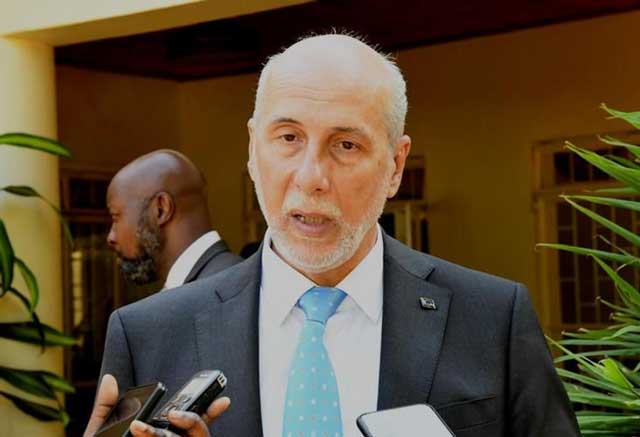
Kampala, Uganda | THE INDEPENDENT | Five organizations in Uganda have secured 1.6 Billion Shillings to boost conservation activities and livelihoods around protected areas.
The funds are from the European Union (EU) and the Organization of African, Caribbean and Pacific States (OACPS). They will be availed through the International Union for Conservation of Nature (IUCN) Save Our Species African Wildlife Initiative and the BIOPAMA Action Component (AC), both managed by the IUCN.
BIOPAMA, the Biodiversity and Protected Areas Management programme aims to improve the long-term conservation and sustainable use of natural resources in African, Caribbean and Pacific (ACP) countries, in protected areas and surrounding communities.
In 2020, in response to COVID-19 and the loss of income for many projects in protected areas, IUCN Save Our Species and the BIOPAMA AC opened a special call for proposals to alleviate impacts specifically arising from the pandemic.
A range of activities now being implemented to alleviate the impacts includes diversifying livelihoods to absorb the loss of tourism income, implementing health protocols to protect gorillas, and clearing invasive species to secure rhino habitat.
The Environmental Governance Institute (EGI), Conservation through Public Health (CTPH) and the Rhino Fund Uganda are implementing these activities in and around Murchison Falls National Park, Bwindi Impenetrable National Park, and Ziwa Rhino Sanctuary. The other projects are; Ecological Trends Alliance aimed at fighting lion persecution in Queen Elizabeth National Park, as well as the Snares to Wares Initiative.
“This transforms wire snares taken from Murchison Falls National Park into sculptures that not only generate alternative revenue opportunities for local communities but also shine a spotlight on illegal poaching practices,” says IUCN.
The group says that while the challenges facing this sector have existed for a long, many have been exacerbated following the COVID-19 Pandemic.
“But we have also seen a greater appreciation of nature and the importance of conservation. Working together with various stakeholders including local communities IUCN is confident that we will develop more resilient ecosystems for the benefit of nature and people,” says Luther Anukur, the Regional Director for Eastern and Southern Africa.
The EU Delegation in Uganda says these response activities are designed to address conservation and wildlife protection in these very difficult times plagued by the COVID-19 pandemic.
The Head of Delegation, Attilio Pacifici says these actions are also important to preserve the foundation for the future of the beauty of the country because it is what guarantees the future of Uganda’s tourism sector.
“Protecting the wildlife species is about protecting us and our lives. It is about safeguarding the future of our daughters and sons and securing for them a world in which they can live,” he says.
The Environmental Governance Institute (EGI), operating in the Murchison Falls belt, will get a Rapid Action Grant of 260 Million Shillings for one year.
In response to this situation, EGI supports them in diversifying and developing alternative livelihoods, through training on alternative land use, photography, writing, communication and catering.
The project is expected to promote the conservation of various threatened species, including elephants, carnivores and primates.
The Conservation through Public Health (CTPH) which operates around the Bwindi Impenetrable National Park received 442 Million Shillings for one year, to boost health measures to protect mountain gorillas. The Park is home to 43% of the remaining 1063 free-ranging Mountain Gorillas in the world, and health expects says If COVID-19 were to infect the park’s gorilla population, it could have a devastating impact. CTPH will ensure the protection of endangered primates by conducting thorough and frequent COVID-19 tests on both humans and gorillas, and by training staff on COVID-19 prevention and gorilla health monitoring.
The project will also help the local community generate alternative sources of income by training farmers on how to grow and sell organic coffee. It is hoped that the income generated from the sales will reduce the dependence of the communities on gorilla habitat to meet basic needs for food and wood, limiting human-gorilla contact as much as possible.
The Michigan State University’s Snares to Wares Initiative targets the wider Murchison Falls Conservation Area in North-western Uganda. The initiative will receive 311 Million Shillings aimed at removing and stopping the use of wire snares that are taken into Murchison Falls National Park and anchored to trees across frequented hunting trails.
Though the intended targets of this activity are typically antelope, wire snares are indiscriminate and capture both target and non-target species. This project will also provide artistic training to the local community to transform the wires from the snares into sculptures that will be sold to generate income.
Another grant of 397 Million Shillings for 2 years will go to the Ecological Trends Alliance (ETA), to prevent the persecution of lions in Queen Elizabeth National Park.
Reports at the Uganda Wildlife Authority say that the lion population in Uganda is deteriorating due to human-lion conflict in and around Protected Areas especially Queen Elizabeth National Park.
ETA aims to reduce the number of both livestock depredation by lions and of lions persecuted in the four enclave villages.
Additionally, by involving the local community, the goal is to strengthen the relationship between local communities and the Protected Area.
The program has also given the Rhino Fund Uganda, a rapid response grant of 221 Million Shillings to, among other things, reinstate a Biodiversity Management Program at Ziwa Rhino Sanctuary. The program was suspended due to Covid-19.
It aims to improve the habitat for white rhinos by bush clearing and invasive species management allowing suppressed grasses to flourish. The success of the program to date shows that it will enable other wildlife and bird species to utilize the improved habitat thereby increasing biodiversity.
********
URN
 The Independent Uganda: You get the Truth we Pay the Price
The Independent Uganda: You get the Truth we Pay the Price



